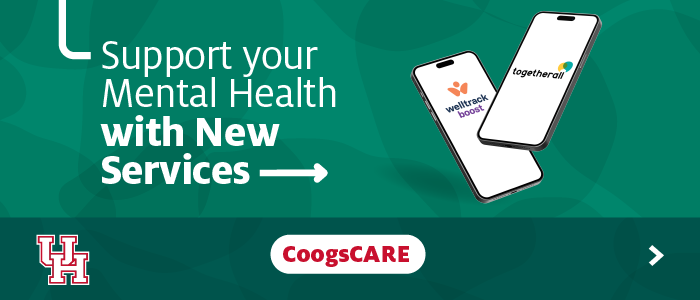
Navigating Through the Mental Health Tide: UH’s Comprehensive Approach Toward Wellness on Campus
DSA News
October 12, 2023
By Shawn Lindsey, Associate VC/VP, Media Relations — 713-743-5725
The University of Houston is expanding its efforts to address the rising tide of mental health needs across campus. At a time when more than 60% of college students nationally meet the criteria for at least one mental health challenge, UH is championing a holistic approach. New initiatives emphasize the well-being of not just students, but also faculty and staff. After all, employees have a pivotal role in supporting both students and peers, and it's crucial for employees to focus on their own mental and emotional health.

- Togetherall is a 24/7 online peer-to-peer support community, moderated by mental health clinicians. Students can interact anonymously, share their experiences and access numerous mental health resources.
- Welltrack Boost offers students a self-guided tool with regular wellness assessments, self-help therapy courses and interactive features to enhance behavioral health.
- UH expanded the opportunities for group therapy on campus and revamped trainings to better equip faculty, staff and students to support their colleagues and peers in need.
- Student Housing & Residential Life added five dedicated professionals to directly support residential students through new programming and one-on-one conversations.
- Mental health messaging about available services is included on the syllabus for fall 2023 classes.
- A pilot project is in development that will embed mental health counselors in additional colleges, similar to the services available in the Tilman J. Fertitta Family College of Medicine.
- Wallet cards were distributed at new faculty orientation and are available to faculty and staff to distribute at their offices or events. Send your material request to: uhmktg@central.uh.edu.
- Handbills and CoogsCARE promotional items, including pop-it fidget keychains that can be used for soothing and destressing, were distributed at Cougar Move-In, Weeks of Welcome and Cougar First Impressions.
- Digital Screens across campus are used to spread awareness of the new CoogsCARE website and featured services.
- The inaugural CoogsCARE Monthly newsletter was distributed this month to students, faculty, staff and parents.
- Messaging in the form of signage and door clings are being installed throughout campus.
"The CoogsCARE initiative is not a sprint toward better mental health, but a marathon to cultivate a lasting culture of care and eradicate the shadows of its stigma,” said Lisa Holdeman, UH’s vice president of marketing and communications who is leading the effort to increase awareness of available resources. “The University’s commitment to address these challenges openly and honestly is unwavering and enduring."
Building the JED Initiative at UH
Daniel Maxwell, interim vice president for student affairs, noted that one CoogsCARE project making significant strides is the UH’s JED Campus Initiative. Originating from The Jed Foundation, the JED Campus Initiative collaborates with hundreds of colleges and universities across the nation, guiding them through a comprehensive process that refines mental health, substance use and suicide prevention approaches. The JED approach focuses on seven areas of action, including:
- Substance abuse
- Develop life skills
- Social connectedness
- Mental health supports
- Identifying students at risk
- Increasing help-seeking behaviors
- Crisis management and means restriction
“We are grateful for the dedicated team of students, faculty and staff who have volunteered their time and expertise to advance UH’s JED strategic plan,” Maxwell said. “The work being done by our JED Campus initiative is reimagining the means by which we enhance student emotional wellbeing.”
The work being done as part of JED Campus is also advancing recommendations from last spring’s mental health task force and the external review of UH’s Counseling and Psychological Services (CAPS). The team has developed a UH-specific approach to improving mental health on campus. One example is the launch of "You Can Help a Coog" training, which equips the UH community to recognize and refer students in need of mental health support.”
“Our efforts to improve mental health and wellbeing on campus involves all of us,” Maxwell explained “We are not just focused on students. While our faculty and staff have a pivotal role in responding to others in need, we recognize that they also may need assistance and support themselves. It really has to be everyone’s responsibility at the University to create a culture of wellbeing.”